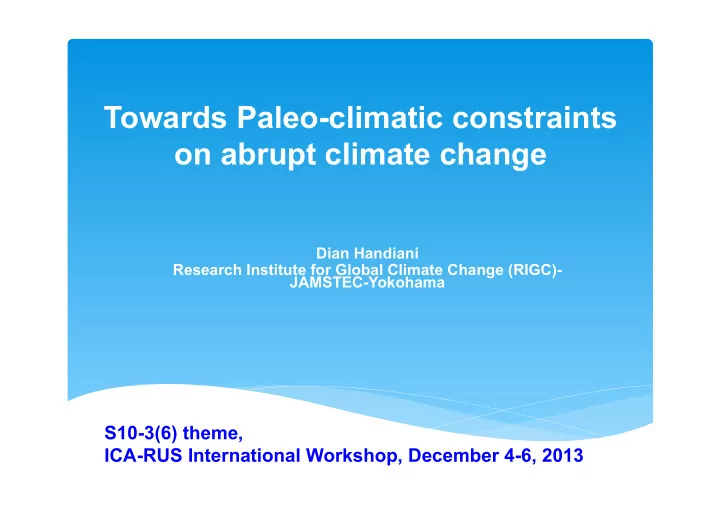

Towards Paleo-climatic constraints on abrupt climate change Dian Handiani Research Institute for Global Climate Change (RIGC)- JAMSTEC-Yokohama S10-3(6) theme, ICA-RUS International Workshop, December 4-6, 2013
Outline * Background of study, * Scientific questions, * Preliminary results and * Summary and future plan overview.
Background of study * Abrupt climate change shows in the last glacial, e.g. Heinrich event 1 (HE1, ~17 ka BP) and Bølling- Allerød (BA, ~14.5 Ka BP), * Abrupt climate change is at least hemispheric, if not global, in extent, * Abrupt climate change is caused by changes in ocean circulation, e.g. by fresh water release as a result of disrupted icebergs melting or diminished North Atlantic Deep-water (NADW) formation , tight correlate with Atlantic Meridional Overturning Circulation (AMOC)
Ocean sediment records during Heinrich events (HEs) after H-Event during H-Event before H-Event Andrews et al., Paleoclimatology Slide Set “Heinrich Events”; Core site HU87033-009, Hudson Strait
Ice-core records in high latitude Liu et al., (2009) Alley (2007) Ø Surface air temperature from proxy records in Greenland (GISP2) and Antarctic (Byrd) over the past 100,000 years show an abrupt climate change, e.g. HE1 and BA event. Ø SAT on GISP2 decreases by 4 o C at HE1 and increases by 15 o C at BA, all changes occurring in less than 200 years. The changes correlate to changes in NADW formation. The red circles indicate these events and changes.
Ocean sediment records in the tropics Kim et al., (2003); Dupont et al., (2008) McManus et al, (2004) Ø Heinrich events are likely associated with a slowdown of the AMOC, in sub-tropical Atlantic has cold and fresh surface water condition (3 º -4 ºC cooling), Ø The vegetation pattern also occurs in west tropical Africa (Angola) rain forest cover decreases, while coastal desert cover increases.
Models of freshwater hosing in past climate Kageyama et al, 2013 Gong et al, 2012
Models of AMOC responses to freshwater hosing and RCP ’ s scenario Stouffer et al, 2006 Ø AMOC and tempera- ture response to fresh- Weaver et al, 2012 water forcing under pre-industrial climate is much smaller than the results obtained from glacial climate, Ø AMOC strength reduces over RCPs scenario experiment.
Research questions * What is causing the difference responses of AMOC in the models? à to investigate the possible mechanisms, à to tune parameters and improve the models, * How likely is abrupt climate change in future causing from AMOC changes?
Models with freshwater hosing experiments Variety of different: à models, à climate background and, à amount of freshwater forcing GCM models: à FAMOUS (x), Singarayer and Valdes., 2010 à MIROC (x), Chikamoto et al., 2012 and à CCSM3 (x), Merkel et al., 2010 , EMIC models: UVic ESCM (x), Weaver et al., 2001
Glacial “ control ” climates FAMOUS; 17KaBP MIROC; LGM UVic-ESCM; LGM CCSM3; LGM
Models result from freshwater hosing experiment in glacial climate CCSM3 Temperature AMOC strength MIROC UVic-ESCM The AMOC strength and temperature over Green- land vary in response to freshwater hosing at 0.1 Sv.
AMOC response to freshwater hosing in different climate condition AMOC in pre-industrial climate AMOC in glacial climate
AMOC models stability analysis FAMOUS UVic ESCM Fov is the freshwater flux by the MOC into the Atlantic through 30º-32ºS and it provides information if the MOC is in monostable (Fov>0) or bistable region (Fov>0).
Summary Simulations of Heinrich events using freshwater hosing in all models produce: Ø various AMOC responses and its different sensitivities to background climate state, Ø magnitude of AMOC and temperature changes are also sensitive to background climate state, but the pattern of these changes are similar. Future plan overview à to do regional analysis to compare with proxy data. à to improve understanding different climate responses to fresh- water hosing in distinctive background climates in each model. à to test AMOC stability properties behaviour in each model and understand potential driver of the ocean circulation change. ¡
Recommend
More recommend